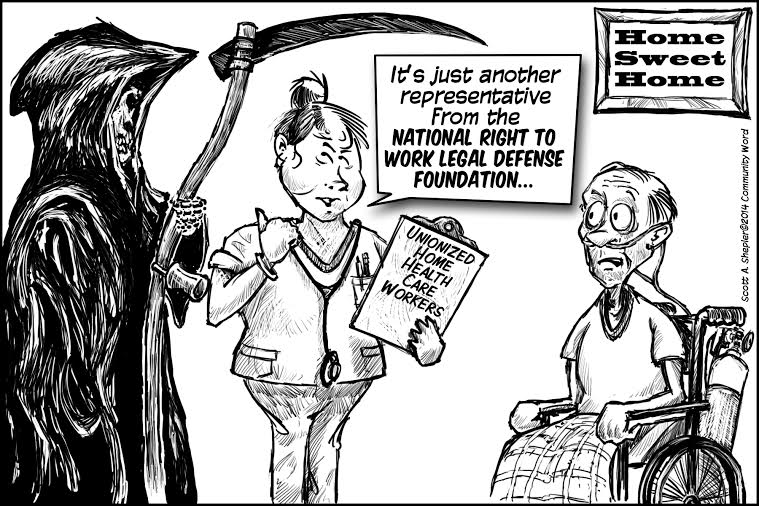If you don’t have elderly parents who rely on home health care, don’t have home care yourself or you’re not a union organizer, why should you care about unionizing home health care workers?
Care because this issue is at the epicenter of income inequality, fair pay, women’s rights and public subsidies for private profit. Care because unions advocate for increases in the minimum wage, and that benefits the entire economy. Care because Illinois argued in the Supreme Court in Harris vs. Quinn and lost. Assistance in that case against “fair share,” “agency fee” for unions came from the National Right to Work Legal Defense Foundation that gets support from Charles Koch and the Walton family.
Capitalism inherently tilts toward maximizing profit often at the cost of worker exploitation, poverty and injustice. Capitalism trumps basic human rights and the push for a living wage. Capitalism works best when it’s held in balance by unions, and unions work best when they are held in balance by capitalism. When that balance tilts toward either side, power can become arrogant and myopic.
That zone of balanced equilibrium is the exquisite evolution of the American free enterprise system. That zone is not socialism. That zone is democracy.
When, as with the home health care industry, there is no balance, workers are vulnerable. They care for the elderly and disabled. They work in one of the fastest-growing, least-protected, lowest-paid professions in the country today. As the population ages, the home health care profession will grow. Demand for home health care workers is expected to double by 2030.
Today there are about three million home care workers and fewer than one-third are unionized. Of those three million, 40 percent receive food stamps and Medicaid, 92 percent are female, 30 percent are black and 12 percent are Hispanic.
Home care franchises comprise a profitable $84 billion a year industry that grew 9 percent a year from 2001 to 2009. It’s reasonable to cut into that profit margin to pay a fair wage so people don’t work full time and live in poverty.
Average pay in this profession is typically $9.50 an hour, but in Illinois, unionized home care workers earn an average of $13 and hour plus health benefits and training. Helping elderly people remain at home when they want to rather than going into a nursing home saves the state an estimated $600 million a year.
It wasn’t until the Obama Administration that minimum wage and overtime protection were extended to include home health care workers. Home health care was formerly classified as “companionship services” like babysitters and exempt from minimum wage and overtime. Because of the Obama Administration, extension of the Fair Labor Standards Act to include home health care will take effect Jan. 1, 2015.
The Supreme Court issued its 5-4 ruling in June in Harris vs. Quinn and found unions in some cases do not have the right to collect fees from those who don’t want to join. However, because of the union, average pay for home health care workers in Illinois is above the industry average. In return for collective bargaining, Illinois required “fair share” contributions from all workers to cover the cost of representation. That’s been a bedrock principle of American labor law. Workers should not reap the benefits of collective bargaining without contributing to the cost.
In Harris vs. Quinn, the Supreme Court framed this as a First Amendment case: compelled speech vs. the right to refrain from speech; free expression vs. collective expression. However, deriving a benefit but not paying a fair share toward it is not free speech. It’s free loading.
Clare Howard


Recent Comments